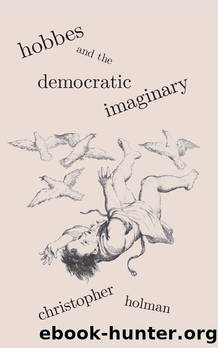Hobbes and the Democratic Imaginary by Christopher Holman;

Author:Christopher Holman;
Language: eng
Format: epub
Publisher: State University of New York Press
Published: 2022-06-15T00:00:00+00:00
In Hobbesâs account, people only wish to participate in government for the sake of vainglorious self-aggrandizement: âThere is no reason why anyone would not prefer to spend his time on his private business rather than on public affairs, except that he sees scope for his eloquence, to acquire a reputation for intelligence and good sense.â147
If such is Hobbesâs stated position in De Cive, in Leviathan the ground of the critique of democracy shifts substantially and in such a way that should cause us to question the sincerity of Hobbesâs positing of a general political apathy. As we have seen, whereas in De Cive the institution of the commonwealth was still thought in terms of a necessarily originary democratic moment, in Leviathan Hobbes thought he had jettisoned this necessity with the introduction of the schema of authorization, in which collective political participation on the part of a people united prior to sovereign institution was unnecessary for the foundation of the state. Given this situation, in which the self-activity of the peopleâthe generalized participation of all in collective political processesâis not required for political institution, the critique of democratic sovereign preference became far less urgent. Hobbes simply lays out his case as to why democracy is the inferior sovereign form, but there is no basis to presume that it is somehow the most natural, reflecting a fundamental popular sovereignty preexisting representation. Hence the paradoxical situation in which the disappearance of the language of original democracy is simultaneously accompanied by a reappearance of the language of participatory desire, which contrary to De Cive, Hobbes now says that all individuals do in fact possess.
The second important fact to take note of here was discussed extensively in chapter 3 and that is the Hobbesian recognition of the radical diversity of human appetite and sensory experience. It is important to remember this diversity in light of what might be formulated as a potential objection to my argument: Is it not the case, for example, that human beings naturally desire many things, such as glory and preeminence, whose pursuit is clearly antithetical to the maintenance of peace? From my perspective such an argument is not valid, for it universalizes particular psychic orientations that Hobbes was clear to maintain are not in fact species characteristics. Contrary to various vulgarizations of Hobbes, there is very little that is essential about the trajectory of human desire, Hobbes being extremely skeptical about the possibility of identifying a set of natural human appetites shared by all. This fact is revealed with special clarity in Gabriella Slompâs important work on Hobbes and the problem of glory, the latter being most often identified as that essential human passion in need of, if not absolute renunciation, at least complex regulation. As Slomp convincingly shows, however, even if in his earlier work glory appears to function as the âgenus of all passions,â it becomes evident in Leviathan and De Homine that it is in fact âjust a species, or instance of human emotions.â148 Although all individuals
Download
This site does not store any files on its server. We only index and link to content provided by other sites. Please contact the content providers to delete copyright contents if any and email us, we'll remove relevant links or contents immediately.
The Secret History by Donna Tartt(18232)
The Social Justice Warrior Handbook by Lisa De Pasquale(11963)
Thirteen Reasons Why by Jay Asher(8472)
This Is How You Lose Her by Junot Diaz(6463)
Weapons of Math Destruction by Cathy O'Neil(5854)
Zero to One by Peter Thiel(5508)
Beartown by Fredrik Backman(5372)
The Myth of the Strong Leader by Archie Brown(5250)
The Fire Next Time by James Baldwin(5033)
How Democracies Die by Steven Levitsky & Daniel Ziblatt(4972)
Promise Me, Dad by Joe Biden(4916)
Stone's Rules by Roger Stone(4875)
100 Deadly Skills by Clint Emerson(4700)
A Higher Loyalty: Truth, Lies, and Leadership by James Comey(4567)
Rise and Kill First by Ronen Bergman(4554)
Secrecy World by Jake Bernstein(4407)
The David Icke Guide to the Global Conspiracy (and how to end it) by David Icke(4397)
The Farm by Tom Rob Smith(4332)
The Doomsday Machine by Daniel Ellsberg(4253)
